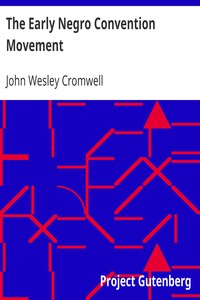The Early Negro Convention Movement by John Wesley Cromwell
"The Early Negro Convention Movement" by John Wesley Cromwell is a historical account published in the early 20th century, specifically in 1904. The book examines the series of conventions held by African Americans from the early 1830s onwards, which aimed to address issues concerning the rights and social standing of free black individuals in the United States during a period marked by increasing discrimination and the rise of slavery. It highlights the
significance of these gatherings as platforms for advocacy, organization, and community-building among African Americans in the face of oppressive societal structures. In this book, Cromwell details the emergence of the Negro Convention Movement, starting from its inception in 1830 with the first national convention held in Philadelphia, which brought together delegates from various states. The text recounts various initiatives that arose from these conventions, such as the establishment of schools, an emphasis on industrial education, and the promotion of moral reform. Cromwell explores notable figures involved in the movement, such as Frederick Douglass and Richard Allen, while also discussing the conventions' stance against the American Colonization Society. Ultimately, the book presents a profound sense of resilience and determination among early African American leaders who sought to uplift their community and advocate for civil rights, laying the groundwork for future civil rights movements in America. (This is an automatically generated summary.)
Read or download for free
| How to read | Url | Size | |||
|---|---|---|---|---|---|
| Read now! | https://www.gutenberg.org/ebooks/31328.html.images | 71 kB | |||
| EPUB3 (E-readers incl. Send-to-Kindle) | https://www.gutenberg.org/ebooks/31328.epub3.images | 114 kB | |||
| EPUB (older E-readers) | https://www.gutenberg.org/ebooks/31328.epub.images | 113 kB | |||
| EPUB (no images, older E-readers) | https://www.gutenberg.org/ebooks/31328.epub.noimages | 94 kB | |||
| Kindle | https://www.gutenberg.org/ebooks/31328.kf8.images | 248 kB | |||
| older Kindles | https://www.gutenberg.org/ebooks/31328.kindle.images | 240 kB | |||
| Plain Text UTF-8 | https://www.gutenberg.org/ebooks/31328.txt.utf-8 | 62 kB | |||
| Download HTML (zip) | https://www.gutenberg.org/cache/epub/31328/pg31328-h.zip | 115 kB | |||
| There may be more files related to this item. | |||||
Similar Books
About this eBook
| Author | Cromwell, John Wesley, 1846-1927 |
|---|---|
| LoC No. | 09024040 |
| Title |
The Early Negro Convention Movement The American Negro Academy, Occasional Papers No. 9 |
| Credits |
Produced by Suzanne Shell, Stephanie Eason, and the Online Distributed Proofreading Team at www.pgdp.net. |
| Reading Level | Reading ease score: 51.5 (10th to 12th grade). Somewhat difficult to read. |
| Language | English |
| LoC Class | E151: History: America: United States |
| Subject | Antislavery movements -- United States |
| Subject | African Americans -- Colonization |
| Category | Text |
| EBook-No. | 31328 |
| Release Date | Feb 19, 2010 |
| Copyright Status | Public domain in the USA. |
| Downloads | 292 downloads in the last 30 days. |
| Project Gutenberg eBooks are always free! | |

